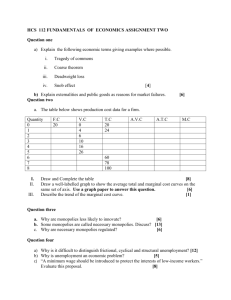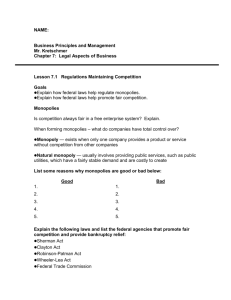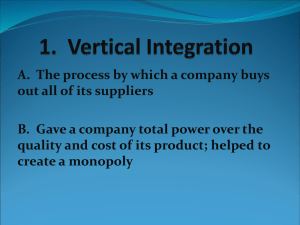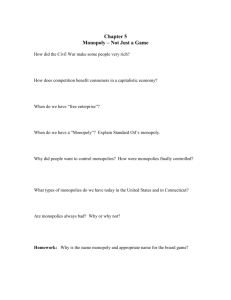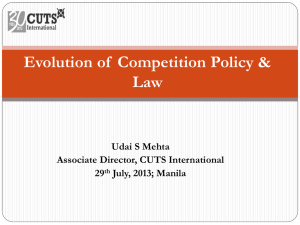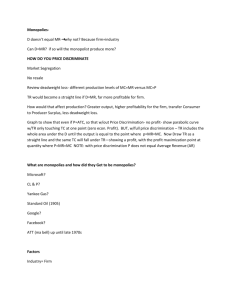File - A Level Business Studies
advertisement
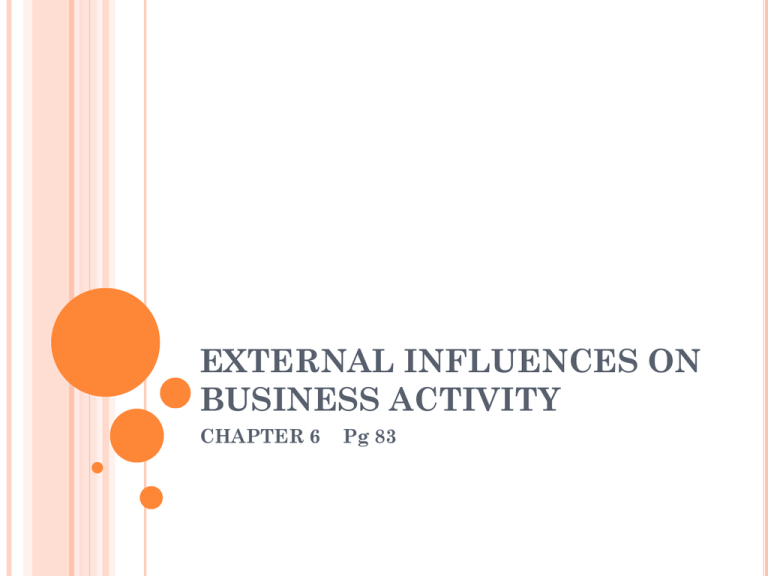
EXTERNAL INFLUENCES ON BUSINESS ACTIVITY CHAPTER 6 Pg 83 LEGAL CONSTRAINTS ON BUSINESS MAIN CATEGORIES Employment practices Consumer rights Business competition Location of business LAW AND EMPLOYMENT PRACTICES 1. 2. Government pass laws to : Prevent exploitation of workers Prevent loss of industrial out put and national income from union collective action LEGAL CONSTRAINTS AND EMPLOYMENT PRACTICES Recruitment ,employment contracts and termination of employment Health and safety at work Minimum wages Trade union rights and responsibilities HEALTH AND SAFETY LAWS Safety equipment Adequate facilities Protection from dangerous machinery Breaks between works Work place temperature EVALUATING THE IMPACT ON BUSINESS OF LEGAL CONSTRAINTS ON EMPLOYMENT AND HEALTH AND SAFETY Silent reading page 86 THE LAWS AND CONSUMER RIGHTS The UK government has passed many pieces of legislation over the past 40 years which aim to ensure that consumers are protected from the negative aspects of the operations of businesses. UK LAWS INCLUDE The Sale of Goods Act, 1979: This states that goods must be of merchantable quality, as described in their advertisements and fit for their purpose. The Trade Descriptions Act, 1968: This makes it illegal for a business to provide false or misleading descriptions of their products, services, accommodation and facilities. The Consumer Protection Act, 1987: This states that it is an offence for a business to give a false or misleading price indication on its product(s) AND businesses are liable for any damage and injury that their defective products cause to consumers. THE LAW AND BUSINESS COMPETITION Free trade benefits consumers. Prices low Improved quality External benefits Laws control monopolies Limit uncompetitive practices between firms MONOPOLIES UK--One firm has control of most of at least 25 % of the market Theoretically means one supplier but this is very rare. HOW DO MONOPOLIES DEVELOP Invention of new products or processes Merging or taking over By legal protection –postal service By existing barriers to entry. e-g advanced technology huge cost etc HOW ARE CONSUMERS AFFECTED BY MONOPOLIES BENEFITS OF MONOPOLIES TO CONSUMERS Low price if large scale production monopoly reduces average costs. Increased expenditure on new product by the monoplist. DRAWBACKS OF MONOPOLIES TO CONSUMERS High prices Limited choice Less investment in new products as monopolist complacent and feels risk of competition. No incentive for the firm to lower the costs and improve efficiency. UNCOMPETITIVE OR RESTRICTIVE PRACTICES Refusal to supply a retailer if they disagree on prices. Full line forcing –to stock whole range of products. Market sharing agreements and price fixing agreements. Predatory pricing IMPACT OF TECHNOLOGY ON BUSINESS ACTIVITY Information technology INFORMATION TECHNOLOGY CAD CAM APPLYING TECHNOLOGY TO BUSINESS POSSIBLE LIMITATIONS Costs Labour relations Reliability Data protection Management IT AND BUSINESS DECISION MAKING Table pg 93 INTRODUCING TECHNOLOGY EFFECTIVELY Analyse Involve Evaluate Plan Monitor SOCIAL AND DEMOGRAPHIC INFLUENCES ON BUSINESS ACTIVITY Aging population Better provision of education Changing role of women Early retirement Rising divorce Job insecurity AGING POPULATION Changing patterns of demand and grey consumers demand differently Age structure of the work force may change PATTERNS OF EMPLOYMENT Labor replaced by capital Transfer of labour from old established industries e-g steel to hi tech industries e-g computer game design Increase in woman workforce Increase in part time employment Increase in student employment Temporary and flexi contract Flexible hours are more common Aging population Women are tending to stay in full time jobs Multicultural countries EVALUATING AFFECT ON BUSINESS OF CHANGING EMPLOYMENT PATTERNS OF EMPLOYMENT. ENVIRONMENTAL CONSTRAINTS ON BUSINESS ACTIVITY The environment and corporate social responsibility ARGUMENT FOR AND AGAINST ADOPTING ENVIRONMENTALLY FRIENDLY BUSINESS PRACTICES Page 98 group activity ARGUMENTS FOR ADOPTING BUSINESS STRATEGIES WHICH ARE ENVIRONMENTALLY SOUND: a) Businesses that reduce pollution by using latest recycled or green equipment can have real marketing & promotional advantage. Companies that damage the environment can suffer adverse consumer reaction. This adverse reaction caused by extensive pressure group activity. b) Law-polluting production will reduce the chances of businesses breaking laws. They can avoid bad publicity & court fines. c) Businesses that switch to an environmentally friendly strategy often report an improvement in the number & quality of applications they receive from potential employees.d) Long-term financial benefits. E.g.: Generating electricity by using solar panels would gain substantial cost savings if the cost of energy generated by oil & gas increases. There is also no external costs. ARGUMENT AGAINST ADOPTING BUSINESS STRATEGIES WHICH ARE ENVIRONMENTALLY SOUND: a)Marketing advantage from keeping costs as low as possible. Society benefit from cheaper goods produced. b) Profits will be reduced if the latest methods of production is purchased.c) Many countries legal protection of the environment is weak. As a result, be little risk of legal action or heavy fines against business activity.d) Developing countries it is argued that economic development is more important than protecting the environment. ENVIRONMENTAL AUDITS Assess the impact of business`s activities on the environment. Independent check Few firms publish it to increase sales as a result of consumer reaction. Workers and managers work together as a team. Better qualified applicants are attracted SOCIAL AUDIT A report on the impact a business has on society .This can cover pollution levels, health and safety record, sources of supplies, consumer satisfaction and contribution to the community. Social audit can include environmental audit H&S e-g number of accidents and fatalities contribution to the community—charity events Employee benefit schemes Sources of supplies ethical or not? Feedback from customers and suppliers on how they perceive the ethical nature of business activities. EVALUATION OF ENVIRONMENTAL AND SOCIAL AUDIT Environmental audits is an investigate process to determine if an existing facility is in compliance with applicable environmental laws & regulations. · An environmental audit would check the pollution levels, wastage levels & recycling rates of the business & compare them with previous years.· These audits are entirely voluntary. ENVIRONMENTAL AND ETHICAL ISSUES –-THE ROLE OF PRESSURE GROUPS-- How do they operate? Pressure group is an organisation with a common interest who put pressure on businesses & government to change policies so that the objective is reached. WAYS OF ACHIEVING GOALS – PRESSURE GROUPS- Publicity through media coverage Influencing consumer behaviour Lobbying of government
